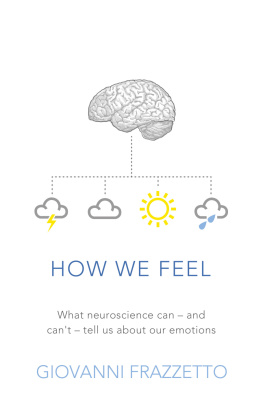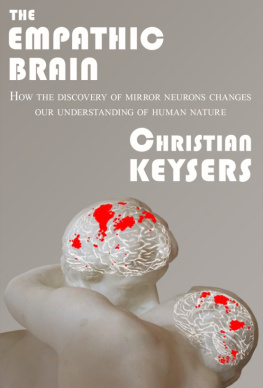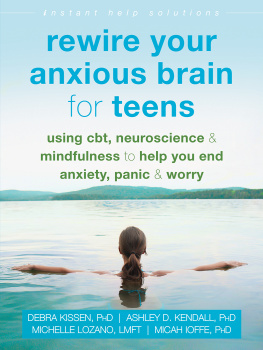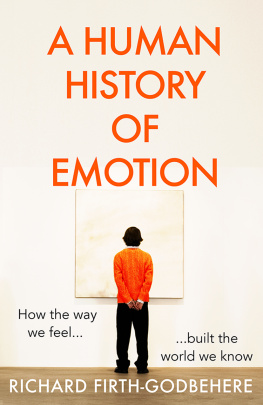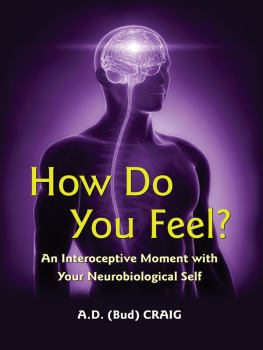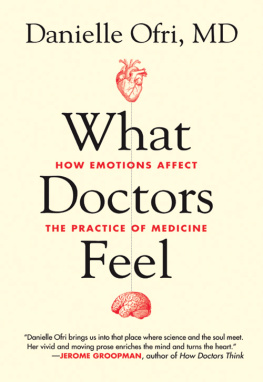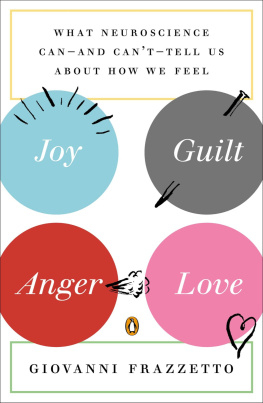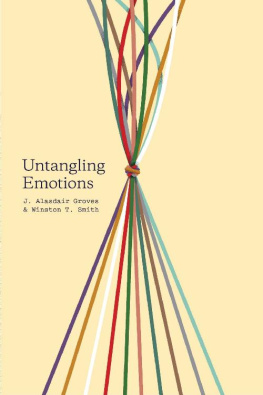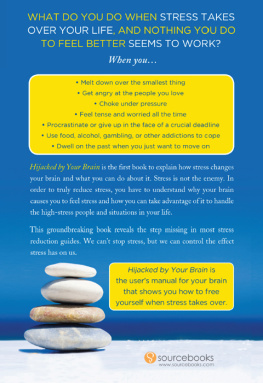Contents
About the Book
We live at a time when neuroscience is unlocking the secrets of our emotions. But is science ever enough to explain why we feel the way we feel?
What can a brain scan, or our reaction to a Caravaggio painting, reveal about the deep seat of guilt?
How can reading Heidegger, or conducting experiments on rats, help us to cope with anxiety in the face of the worlds economic crisis?
Can ancient remedies fight sadness more effectively than anti-depressants?
What does neuroscience tell us about how we feel empathy and fall for an actor on stage?
What can writing poetry tell us about how joy works?
And how can a bizarre neurological syndrome or a Shakespearean sonnet explain love and intimacy?
Giovanni Frazzetto takes us on a journey through our everyday lives and most common emotions. In each chapter, his scientific knowledge mixes with personal experience to offer a compelling account of the continual contrast between rationality and sentiment, science and poetry. And he shows us that by facing this contrast, we can more fully understand ourselves and how we feel.
About the Author
Giovanni Frazzetto was born and grew up in the south east of Sicily. In 1995, after high school, he moved to the UK to study science at University College London and in 2002 he received a PhD from the European Molecular Biology Laboratory in Heidelberg, Germany. Since he was a student, he has worked and written on the relationship between science, society and culture, publishing in journals such as Nature.
He now lives and works between London and Berlin.
How We Feel
What Neuroscience Can and
Cant Tell Us about Our Emotions
Giovanni Frazzetto
TRANSWORLD PUBLISHERS
6163 Uxbridge Road, London W5 5SA
A Random House Group Company
www.transworldbooks.co.uk
First published in Great Britain
in 2013 by Doubleday
an imprint of Transworld Publishers
Copyright Giovanni Frazzetto 2013
Giovanni Frazzetto has asserted his right under the Copyright, Designs and Patents Act 1988 to be identified as the author of this work.
A CIP catalogue record for this book is available from the British Library.
Version 1.0 Epub ISBN 9781448127597
ISBNs 9780857521248 (hb)
9780857521255 (tpb)
This ebook is copyright material and must not be copied, reproduced, transferred, distributed, leased, licensed or publicly performed or used in any way except as specifically permitted in writing by the publishers, as allowed under the terms and conditions under which it was purchased or as strictly permitted by applicable copyright law. Any unauthorized distribution or use of this text may be a direct infringement of the authors and publishers rights and those responsible may be liable in law accordingly.
Every effort has been made to obtain the necessary permissions with reference to copyright material, both illustrative and quoted. We apologize for any omissions in this respect and will be pleased to make the appropriate acknowledgements in any future edition.
Addresses for Random House Group Ltd companies outside the UK can be found at:
www.randomhouse.co.uk
The Random House Group Ltd Reg. No. 954009
2 4 6 8 10 9 7 5 3 1
To Berlins river tour company Reederei Riedel
and in memory of
Yehuda Elkana
(19342012)
Prologue
WHEN I WORKED in a neuroscience laboratory, the rhythm of experiments paced the hours. The lab was an island, a hide-away that felt distant from reality. It was a world of its own, one I had desired to set foot in ever since I turned sixteen. Inside, there was always quite a lot to do: exact solutions to prepare, delicate dissections to perform, precious molecules to purify and animals to take care of. Tightly parcelled one after the other as in a chain, these were some of the tasks that punctuated the flow of my daydreaming and at the same time pointed to big research questions. In between, I filled my lab journal with notes, diagrams and calculations. Trying to understand something as ineffable and intimate as emotions and the mind, I amassed minute fragments and discrete units of technical information.
Venturing into the secrets of the human brain became an opportunity for deep reflection. It was like interrogating an unfamiliar aspect of myself. It was like deciphering a tale written in code about the mind that I myself, with my experiments, was contributing to writing. Brain tissues, neuronal cells and stretches of DNA were the protagonists of a story that, fact after fact, revealed new truths.
Every evening, with my lab coat dirty, my lab journal stained with chemicals, and standing in front of empty glassware piled up in the sink, I would assess the progress I had made. Usually my thoughts were also in need of a rinse. No matter how much I had laboured at the bench, there always seemed to be something left undone. One question demanded another, every experiment begged for confirmation, the results could use a second round of analysis. But the next chapter of the story was always scheduled for the following day.
When I made my way home, the characters from the lab would stay behind and I would latch on to another story still in progress, that of my own emotional life, of which I was the only protagonist, with my own script, the lines and movements of which were also still to be discovered. At home, I was face to face with my emotions.
Emotions, even the most fleeting, pervade every portion of our lives. One minute we are sad, the next we are beaming with hope. Some emotions chase us, others elude us. Every so often, emotions may leave us wounded, or they may consume us. On other occasions they lift us or transport us afar. This is why, sometimes, we think it would be useful to know how to rid ourselves of some of our emotions, or at least learn how to tame them. Occasionally, as in the case of joyful emotions, we wish we could make them recur on demand.
While I was writing this book, whenever I revealed to new acquaintances that I work as a neuroscientist, they, no matter their field, would want to know more. If I then mentioned emotions, there was no risk of failing to strike up a conversation. I found that people would ask me for advice on how to control their temper, how to forget unpleasant memories, how to overcome fears and cultivate joy, and even how to fix or save their love relationships. And they were unfailingly surprised when, even though I studied the brain, I didnt always have answers for them.
We have it from the ancient wisdom of Socrates, the great Athenian philosopher, that discovering the exact causes of a phenomenon does not concurrently reveal its meaning for us and our lives. It seems that in the last days before his death, around 399 BC , Socrates read a book by Anaxagoras, a leading contemporary scientist. He had heard the news that Anaxagoras had discovered an element called nous (mind) that explained the nature of all things.the meaning of life, let alone how it should be lived, he was filled with disappointment. Science was no road to self-knowledge.
This question how to harvest scientific knowledge so as to learn how to live, or to know oneself, for that matter grew no less urgent in the millennia to come. At the end of graduate school I came across a revealing essay: the transcript of a lecture delivered in 1918 by the German sociologist and philosopher Max Weber (18641920) and entitled Science as a Vocation. Going by its title, I was hoping to find there an echo of my passion for research. In the essay Weber addresses an audience of young students on the meaning and value of science for both personal and broader questions in life. Its take-home message was not encouraging. For Weber, science was responsible for a process of profound intellectual rationalization, which he termed a disenchantment in German,
Next page
